What is so special about Swedish Leadership? Interview with SACC Member Mikael Dahlgren, Alfa Laval
 Jan Marklund is the co-author of the book “From stagnation to success – Solution Focused tools for newly appointed managers” [Swedish title: Från tomgång till framgång – lösningsfokuserade verktyg för nyanställda chefer] published 2016. A practical handbook for leaders in how to use Solutions Focus to get traction and accelerate success in a new management role. Working with managers, executive teams, athletes and politicians, Jan has extensive expertise around best practice and the common challenges modern leaders face on a daily basis and this book is filled with tips and practical examples.
Jan Marklund is the co-author of the book “From stagnation to success – Solution Focused tools for newly appointed managers” [Swedish title: Från tomgång till framgång – lösningsfokuserade verktyg för nyanställda chefer] published 2016. A practical handbook for leaders in how to use Solutions Focus to get traction and accelerate success in a new management role. Working with managers, executive teams, athletes and politicians, Jan has extensive expertise around best practice and the common challenges modern leaders face on a daily basis and this book is filled with tips and practical examples.
Jan is currently conducting research for his second book, which investigates the typical characteristics of Swedish leadership style, its international reputation and impact on the world. As such, Jan is inviting leaders and managers all over the world, experienced in Swedish leadership, for research interviews.
The SACC connected Jan with one of our Corporate members Mikael Dahlgren CEO and CFO Alfa Laval Oceania.
Here is the interview with Mikael.
What would you describe is common or typical regarding Swedish leadership?
First I must say I haven’t worked in Sweden for a long time. Before my position here in Oceania with Alfa Laval, I was living and working in Germany and the UK.
One aspect that immediately comes to my mind, is inclusive. There isn’t as much hierarchy in Sweden, as there is in many other countries. You don’t feel like you are treated in a certain way because you are at the top and in another if you are further down. Amongst management, there aren’t so many ”generals” but rather ”gardeners” who want to nurture employees and help them grow. They show interest, empathy and really listen to others needs and viewpoints. I would say there is mutual respect.
Being personal, maybe sending a Happy birthday-mail with an extra greeting: ”Happy Birthday, we hope you stay with us many more years to come” is important.” It’s free, there is no cost involved what so ever and it makes a huge difference. People feel appreciated and special.
One reason for this cultural difference I think stems from early childhood and in Swedish schools, the fact that kids are treated in a certain way. There is an open dialogue between students and teachers from early on. You are trained to take responsibility and set your own goals, not just get good marks. The teacher asks what you want, what your opinion is. This continues to play out in adult life and in many workplaces.
In Sweden, I think we dare to bring diversity into management teams. When recruiting and organising you look for different competencies and also different opinions. This means you have to be good at delegating and give responsibility to others. Here in Australia recruiting ”more of the same” is more common.
What would you say is important to know or understand when you are working for the first time in a Swedish organisation or commencing cooperation?
In other cultures you might not be used to questioning an issue, to ask ”why”. As I said earlier, you are encouraged from an early age to speak up about your opinion. So leaders do ask for your suggestions more often, they demonstrate more ”trust”. You are encouraged to find new, better solutions and you don’t get punished if you make an error. To show trust applies both ways, up-down, down-up. Of course, you don’t see this everywhere, but I would say you see more of this in Swedish companies than in other countries.
Flat organisations are also more common, sometimes in a meeting, you don’t even recognise who is the boss.
A story, told by a friend, true or not, was that a person came into a meeting room and he couldn’t determine by the conversation who was in charge, who the boss was. It wasn’t until a person ”revealed” himself. That person took off his suit jacket… and after that everybody else did. It was a little like the Swedish king at the Nobel banquet, he is the first to sit down, then everybody else follows, a small gesture that reveals who is in charge.
What do you think are the key strengths in Swedish leadership?
Similar to what I said earlier but I could add; giving people opportunities, listening to people, listening to EVERYONE, inviting their input and supporting them to achieve their personal goals.
Anything controversial?
Maybe that Swedish leadership could be seen as too soft by some, too weak in anglo-saxian cultures. But I think that is at first glance, after a while it’s appreciated and builds trust and loyalty.
Other reflections?
During Covid, working from home hasn’t been appreciated by everyone. Some managers here in Australia have been sceptical. Will things be done that should be done? Could you actually trust the employees? Quite a few managers were surprised because most things were accomplished on time, without surveillance. I think that if you can’t trust the people working in the company, perhaps they should not be working in the organisation. Actually, through current technology platforms, you are able to check up on your team members activity and their laptop use. I would never dream of doing that, but I’m sorry to say that I know that some managers do. To me, the most important thing is not how many hours someone has been working but rather what their output is.
Interviewer and author, Jan Marklund founded GongGång Ledarutveckling i Sverige AB, offering leader development programs, individual coaching and a range of interactive workshops, all based on the solutions-focused and salutogenic approach. For over 15 years, he and his team have assisted managers and executive teams in identifying and applying their existing strengths, shifting mindsets and approaches through constructive reflection and a range of practical tools for the big and small challenges that occur in the every-day-life of managers and executive teams. * Solutions Focus in Organizations, an international network of solution-focused practitioners which promotes, supports and develops research and applications of Solution Focus in Organisations.
You are welcome to contact Jan if you have any questions and are interested in taking part in his interview research:




Leave a Reply
Want to join the discussion?Feel free to contribute!